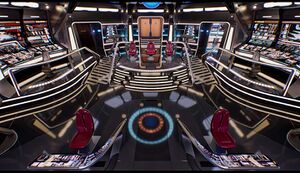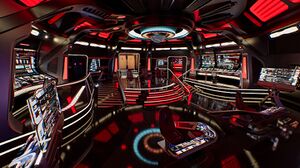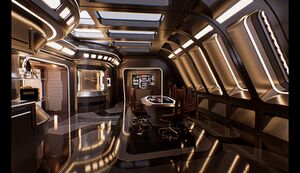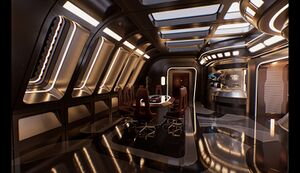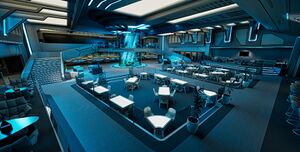USS Hypatia
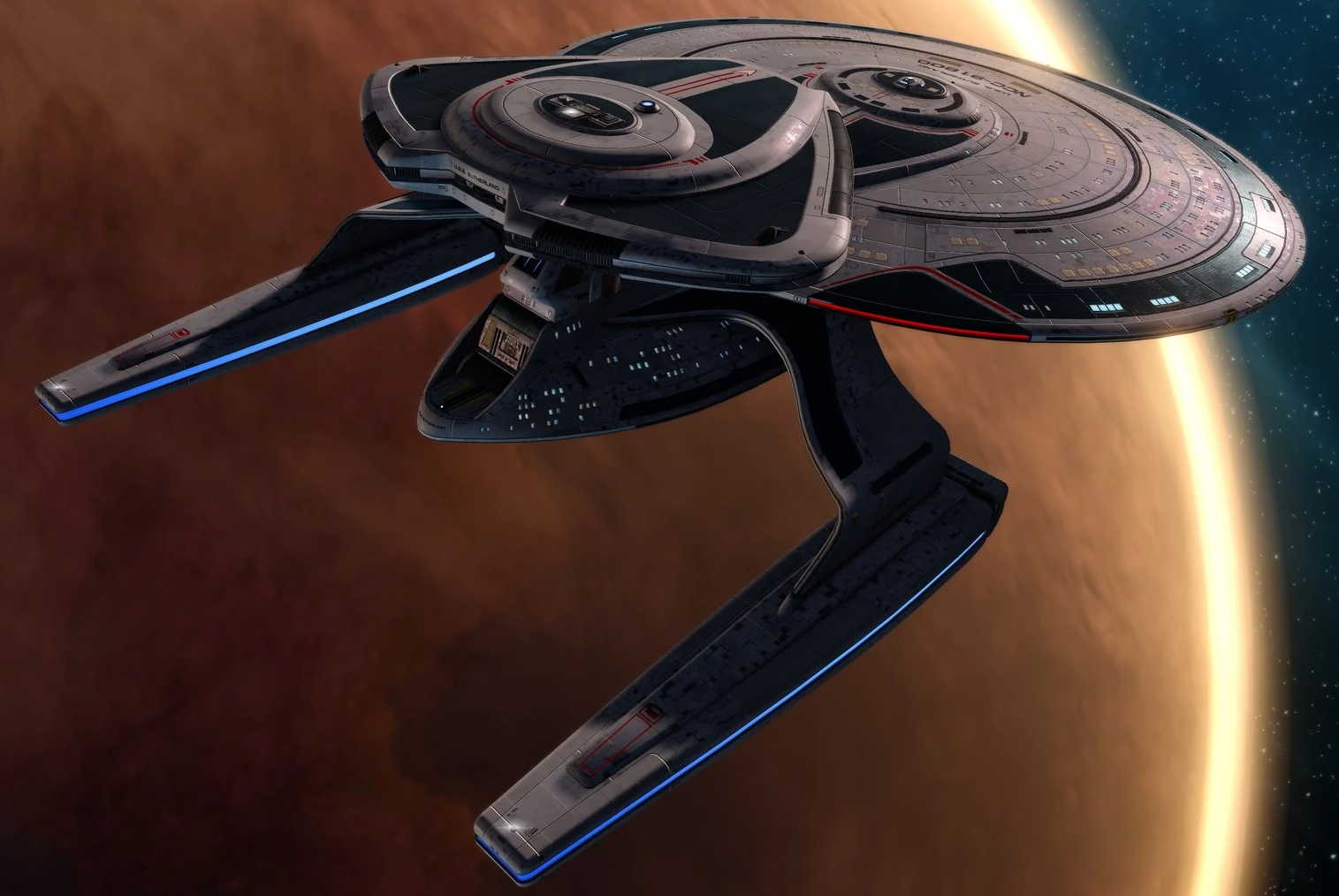
| |
| USS Hypatia | |
| General Information | |
| Registry | NCC-91825 |
| Class & Type | Sutherland-class Research Cruiser |
| Affiliation | Starfleet |
| Status | Active |
| Commissioned | 2401 |
| Assignment | |
| Task Force | Task Force 17 |
| Task Group | Task Group 9 |
| Squadron | Lakota Squadron |
| Home Port | Deep Space 17 |
| Role | Research Cruiser |
| Key Personnel | |
| Commanding Officer | Captain Giarvar Kauhn |
| Template:Starship | |
- "Reserve your right to think, for even to think wrongly is better than not to think at all."
- —Hypatia - Ship's Dedication Quote
USS Hypatia is a Sutherland-class research cruiser serving in the Fourth Fleet's Task Force 17.
Named after one of Earth's most famous philosophers and astronomers from Alexandria, Egypt, Hypatia is a vessel of great size and significance. On the surface, she is equipped with all of the necessary equipment and personnel to carry out an array of scientific and exploratory endeavours, but beneath the surface hides something curious. Adjustments made to the vessel following the appointment of her commanding officer have equipped her with systems that allow her to fulfil a dangerous objective; to gather intelligence on Klingon movements near the Romulan Republic and perform reconnaissance patrols as required by Starfleet and their Romulan allies.
As the first of her name to ever grace Starfleet, it is up to Captain and crew alike to forge a name commensurate with the legacy of such an influential thinker and mathematician.
Mission Objectives
Once her shakedown is complete and the rest of her senior staff finalised, Hypatia will embark on missions with a primary focus on scientific exploration. She will, however, gather intelligence and reconnaissance data where required as part of her secondary mission profile. Missions she will conduct include:
- Utilising the vessel's advanced sensors and long-range capabilities to identify and investigate unexplored sectors of space, cataloguing new phenomena, stellar bodies, and potential resources.
- Conducting a wide range of interdisciplinary scientific studies, including astrophysics, exobiology, planetary geology, and stellar cartography, to deepen our understanding of the universe and its inhabitants.
- Conducting in-depth surveys of planets, moons, and celestial bodies to assess their geology, climate, atmosphere, and potential for colonisation or resource extraction. Study indigenous life forms and ecosystems to support conservation efforts and cultural understanding.
- Facilitating diplomatic missions and cultural exchanges with newly encountered civilisations, fostering peaceful relations and mutual understanding through scientific collaboration and shared knowledge.
- Providing assistance in disaster relief efforts, such as planetary natural disasters, medical emergencies, or humanitarian crises, utilising the vessel's medical facilities, transporters, and supply capabilities to support affected populations.
- Investigating ancient ruins, artefacts, and archaeological sites to uncover clues about lost civilisations, cultural heritage, and the history of the galaxy, preserving valuable knowledge and artefacts for future generations.
- Studying and analysing anomalies such as wormholes, subspace rifts, temporal disturbances, and gravitational anomalies to understand their nature, effects on space-time, and potential applications for travel or communication.
- Monitoring the health of ecosystems, celestial phenomena, and cosmic phenomena to assess the impact of stellar events, spacefaring activities, and climate change, contributing to efforts to preserve the natural balance of the cosmos.
- . Collaborating with other Starfleet vessels, scientific institutions, and allied organisations such as the Federation Science Council, Vulcan Science Academy, and Daystrom Institute to share knowledge, resources, and expertise in pursuit of common scientific goals.
Technical Configuration
Main Article: Sutherland-class Research Cruiser
Whilst it is clear that Hypatia will utilise many of her standard equipment and technologies to complete her primary objectives, she was given an impromptu refit upon the arrival of her commanding officer, Captain Kauhn. Having been assigned a secondary objective as an intelligence and reconnaissance platform in the dangerous border regions of the Beta Quadrant, Captain Kauhn authorised yard engineers at Avalon Fleet Yards to replace the standard sensor pod with the tactical mission pod, improving her armaments and defensive array whilst still maintaining much of the sensor and communications capabilities she had previously.
Key Location Data
- Main Article: Hypatia deck listing
- Main Article: Tour of the Hypatia
With some 45 decks to her name, Hypatia is one of the largest vessels in Starfleet, even eclipsing the mighty Odyssey-class heavy explorer by five decks. Much of the ships internal volume is shared between the science, medical and engineering divisions.
Bridge
A reflection of the time period she was created, the polished steel and cool metal fixtures of the bridge aesthetics bring back memories of years gone by, her design blending modern technological advancements with the nostalgia of eras long gone. It is a functional, yet aesthetically pleasing facility designed in a similar vein to the rest of the ship. Her greatest feature is a wide-angled window which fills the forward bulkhead. This window has holographic projectors built into the rim, giving it the ability to function as a more traditional viewscreen. It can also be used as an emergency evacuation hatch, with forcefields being lowered until replaced by a large, external bulkhead.
Dominating the heart of the command center, three command chairs made of red leather sit atop the central platform, colloquially known as the 'Command Deck', surrounded by rails and steps to the lower levels of the bridge. As is tradition, the center seat and its controls are reserved for the commanding officer, or any directly appointed officer in command during his absence. To his right, the executive officer and, to his left, a third seat is generally reserved for the use of the ship's Counsellor, Chief Medical Officer or any official or dignitary the Captain sees fit. All three of the chairs have built-in controls on the armrests, enabling the occupying officers to conduct their duties with unprecedented access to a wide variety of ship systems.
At the foot of the stairs directly ahead (or to the side) of the command deck, the 'Flight Deck' consists of two angled consoles serving as duty stations for operations (port) and flight operations (starboard). A few feet from each, two stand-alone consoles provide auxiliary station access for any purpose required (such as communications, environmental control, mission operations etc). Ascending the stairs on either side of the command deck, the port side bulkhead is home to three large stations dedicated to tactical operations, providing access to the ship's defensive and offensive systems, whilst the starboard bulkhead is dedicated to the various science departments on the ship.
Aft of the bridge, there are two additional consoles behind the command area designated for medical use (port) and engineering (starboard), allowing the engineer on duty access to the same engineering systems as in main engineering itself, including access to environmental controls, propulsion systems and the warp core. Central to the aft bulkhead, open access is granted to the observation lounge, which is sealable by emergency bulkheads and forcefields.
Observation Lounge
Located aft of deck one, the observation lounge aboard Hypatia is one of the standard modular designs from ships of the line in 2400. The observation lounge is intended as a space for the senior staff and other officers to collaborate, celebrate, and make plans for the journey ahead. Continuing the architectural design from the bridge and the passageway, every surface of the bulkhead and decks are plated in metallics of burnished bronze and reflective copper, with practical lighting set into the overhead. The overhead and outer bulkhead visibly curve in kind with the shape of the outer hull, with tall rectangular viewports allowing a view of the stars and the Hypatia’s mission pod.
Large double doors at the aft of the bridge allow access to the observation lounge, with additional doors on the port and starboard side of the lounge providing access to the captain’s ready room, a head, and further deck one. The starboard side doorways are tucked into an alcove adorned with a widescreen LCARS panel for private consultation away from the observation lounge at large.
Stationed parallel to the bridge doorway, in the heart of the room, is a natural-edge wooden conference table of a roughly rectangular shape. Set into the surface of the table are both holographic projectors —for displaying images and data on the surface of the table or on holographic LCARS panes projected at respective eye-levels— along with induction warming plates to keep platters of food warm. The table is circled by ten office chairs, of a shape inspired by a retro-throwback to the 2360s, and upholstered in a deep maroon textile which was commonly used in the bridge as well.
The observation lounge operates an open-door policy and, in the absence of a more traditional ready room attached to the bridge, the Captain often uses the observation lounge as a workspace so that he does not have to return to his quarter in potentially serious situations.
Opposite to the viewports, built-in shelves and a replicator are set into the bulkhead. The story of Captain Kauhn’s command —across the USS Arimathea, USS Buran and (albeit briefly) USS Hathaway— is told by the gold plated replicas of each command.
The Alexandria Lounge
Perhaps the most spacious of all recreational facilities aboard Hypatia, the Alexandria Lounge (or simply Alexandria's, as it is more commonly known) is built across two levels and is the most spacious facility on the ship. With dozens of seating areas across both levels, with varying degrees of comfort and privacy, the room is a constant hive of activity for anyone and everyone aboard the ship. People come to work in a relaxed, but active environment, or they may come to sit and read while people mill about and conduct their business. Food is obtained from several replicators around the room, while bar snacks and beverages are available at the bar which is manned around the clock. The room's most exquisite feature is the large, floor-to-ceiling aquarium tank which is maintained by the science division and houses some thirty different species of marine life.
Auxiliary Craft
As Hypatia is named after one of Earth's most pivotal free thinkers and philosophers, the naming conventions for her auxiliary craft relate to famous humans from the same, or similar, period in history.
Shuttlebay 1 - Main Shuttlebay
Shuttlebay 1, or the Upper Shuttlebay, has been modified to house all of the auxiliary craft that make up Centaurus Flight. These auxiliary craft are made up of some of the most advanced small vessel designs ever to serve Starfleet.
Type 14 Shuttles
Archimedes, Euclid, Hippocrates, Pythagoras, Socrates, Zeno
Type 12 Shuttles
Cicero, Democritus, Empedocles, Heraclitus, Lucretius, Ptolemy
Shuttlebay 2 - Runabout Landing Bay
Shuttlebay 2 is the smallest of the auxiliary craft facilities on Hypatia and is the permanent home of two Arrow-class and two Argo-class runabouts.
Argo-class Runabouts
Ammonius, Plato
Arrow-class Runabouts
Aristotle, Theon
